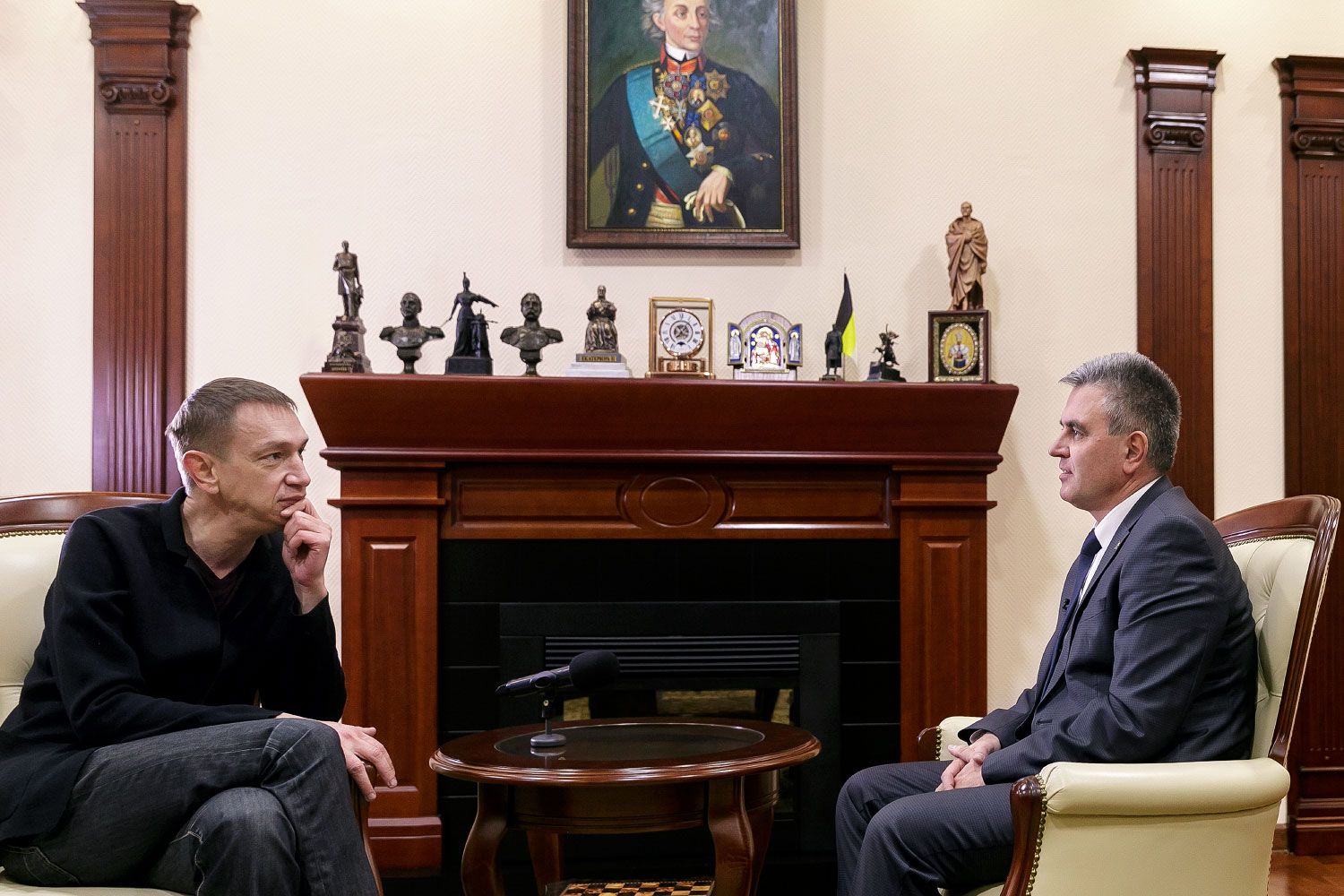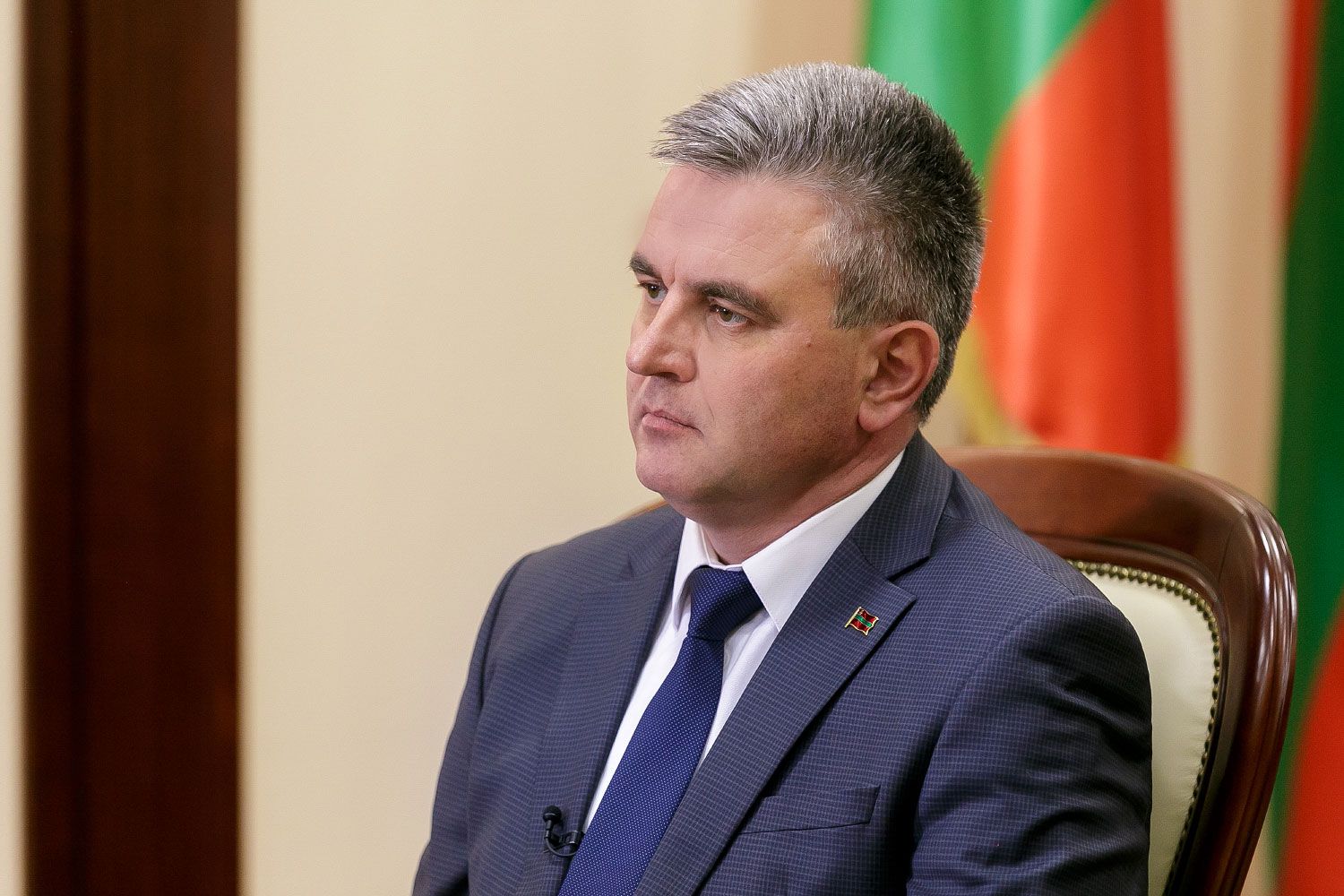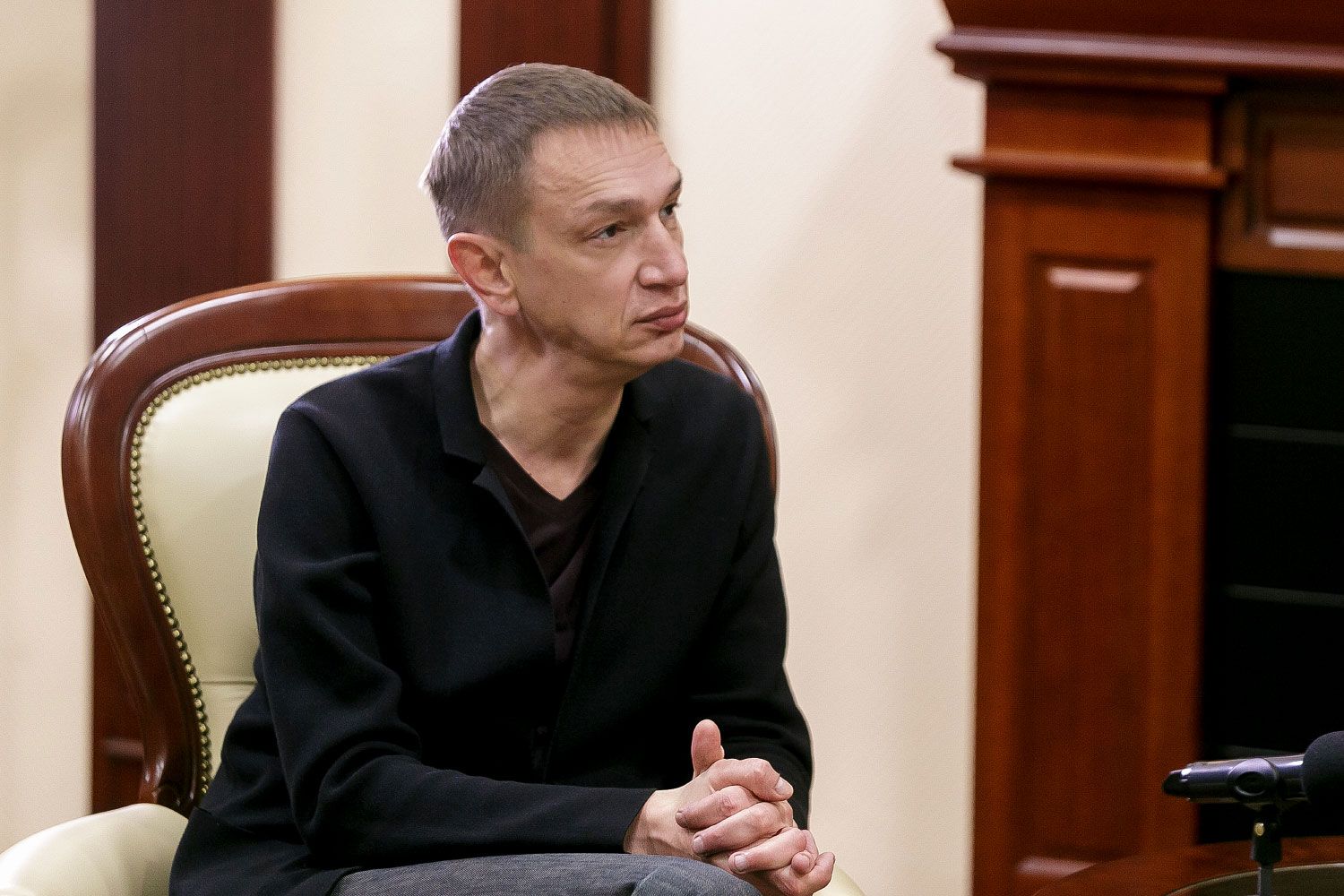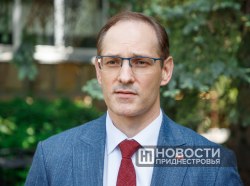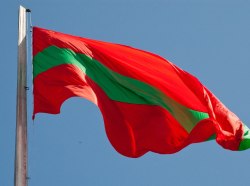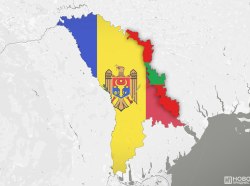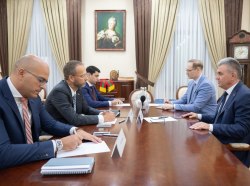The NTV film crew is working in Pridnestrovie. Journalists gather material for the “Results of the week with Irada Zeynalova” news program. They plan to broadcast on Sunday about the situation in Pridnestrovie and the Russian peacekeepers serving here. Representatives of the TV company talked with the PMR President. Vadim Krasnoselsky during the interview called the topic of Russian peacekeeping on the Pridnestrovian land speculative, noting that Moldovan and European politicians return to it from time to time, using it as a proven instrument. The President voiced the position of the Pridnestrovians, who advocate the preservation of the peacekeeping mission in the existing format, which has proven its effectiveness. He spoke about the history of the issue and the practice that had already taken place, when relying solely on observers was not only not justified, but also had tragic consequences (June 19, 1992 - the invasion of the peaceful city of Bendery). Vadim Krasnoselsky also recommended not to make premature conclusions from Mrs. Sandu's statements, attributing them to the electoral circumstances in which they were announced.
***
Alim Yusupov, NTV: Once again there are talks that it would be good to withdraw the Russian peacekeepers. How risky is the situation without Russian peacekeepers here?
Vadim Krasnoselsky, the PMR President: You know, the topic of peacekeepers comes up from time to time, sounds from the lips of different politicians, both Moldovan and European. They constantly speculate on this topic. Someone says: let's withdraw the peacekeeping forces from Pridnestrovie. Someone says: let's change it to some kind of civilian mission. Someone says: let's leave it until the settlement of the Pridnestrovian conflict. The topic is very speculative. I want to express the opinion of the people of Pridnestrovie and my own as President. Remember the history of the armed conflict, the history of 1992. The final phase of hostilities began on June 19, 1992 - this was the invasion of Bendery by armed formations from the Republic of Moldova. What preceded this? Yes, there was already a conflict, there was war, in principle. Nevertheless, the Parliament of Moldova made a decision, literally a couple of days before June 19, on a peaceful solution to the Pridnestrovian conflict. The town was deblocked under the guarantees of the so-called observers (they were - the so-called civilian mission). Two or three days later, on June 19, there was an invasion, an attack on Bendery, on a peaceful city that had been deblocked. Military formations entered Bendery from three sides, and the massacre began. At the same time, some of the observers were withdrawn a day before the hostilities, and some were hidden and evacuated. No one warned the civilian population and local authorities about possible invasion. Moreover (military people will understand), in order to organize the invasion (and the invasion was carried out not by some police unit, but by the armed forces, the mobilized armed forces), it is necessary to announce mobilization at least a month before the invasion in order to fully ensure this offensive. Thus, when the decision was taken, the parliament had already given an order to invade. Did the observers of the so-called civilian mission know this? I think someone knew, someone did not know, but they absolutely did not fulfill their function of ensuring peace and monitoring the implementation of the decisions made. Many people died - both civilians and defenders of Pridnestrovie, many attackers from Moldova also died. Now, when the conflict was raging, when people were dying, an agreement of July 21, 1992 was adopted, and Russian peacekeepers entered our land. They stopped the military conflict. Since that day, there has not been a single serious armed conflict between Moldova and Pridnestrovie. Moreover, this is a joint peacekeeping mission, in which peacekeepers of Russia, peacekeepers of Pridnestrovie, peacekeepers of Moldova, as well as observers from Ukraine participate. Success is absolutely clear: it is the preservation of peace. Therefore, peacekeepers for us are our national interest, akin to our idea of independence, of maintaining peace and security on the territory of Pridnestrovie. Whoever speaks about withdrawal of the peacekeepers may reason differently, give different arguments, but these arguments and these thoughts have nothing to do with the peace. They are related only to the escalation of the conflict. Especially, when the pre-election emotions run high on the territory of Moldova. The people on the territory of Moldova chose not only the president (that's why there was such a turnout, etc.), they chose the vector of development in Moldova, they chose between the West and the East. Many forces were involved in this electoral spiral, and there were statements from former combatants from Moldova (combatants), harsh statements threatening murder, blockades and a new war. That is, this is what can actually happen. Therefore, peacekeepers are the guarantor of peace in our land. We are not talking about any conclusion and, moreover, we will in every possible way prevent even conversations on this topic.
Alim Yusupov, NTV: Ms. Sandu, making these statements - she is also not a new person in politics - understands that this is a technically and practically difficult decision, if it is made in theory. Perhaps this is some part of the political game? Perhaps this was said in the heat of the election campaign? She repeated this after it became known about her victory? Or is it some kind of speculation, which, by and large, does not have the determination to take real steps?
Vadim Krasnoselsky, the PMR President: I would not draw premature conclusions from Mrs. Sandu's statements. We must take into account that there was a very complicated electoral process, there was a colossal nervous tension among all those who participated in this process. Perhaps Mrs. Sandu is broadcasting the request of her electorate in part. What will happen next? We'll see. That is why I say: in order to discuss this topic, you need to know the history of the process, how everything proceeded, and already with this knowledge you need to demand something. At least read the agreement on the basis of which the peacekeepers appeared here, on the banks of the Dniester. We have something to talk about and we are ready for dialogue.
Alim Yusupov, NTV: You mentioned that Mrs. Sandu is trying to play on the interests of her electorate. Do you feel on human level the hostile attitude of the country, Moldova, as not just a certain state, but people?
Vadim Krasnoselsky, the PMR President: No. You know, I cannot say that the people are bad. In no case. A third of the residents of Pridnestrovie are Moldovans by nationality. A third are Ukrainians, a third are Russian and a third are Moldovans. Speech is heard in Moldavian. We have Moldavian schools, additional education in the Moldavian language, there is a higher education in the Moldavian language, in the native Moldavian language. We support the traditions and ethnicity of the Moldovans. It's good. We have a multinational state. I always have a positive attitude towards the people. But there are individuals. If we talk about civil wars in general, then according to statistics - take any civil war, even the insidious one that arose after the October coup - somewhere from two to five percent of the population of the state participate in a civil war. In general, of course, the Moldovan people are peaceful, friendly people, sociable people, and there are no questions. We have family ties between the inhabitants of the right and left banks of the Dniester. There are also a handful of those who will generate a conflict and start shooting. There may be few of them in terms of percentage, but in terms of quantity, it is enough. In addition, someone else must give commands either not to give about the escalation or non-escalation of the conflict. There is a danger in this. In general, there is no conflict of elites, no conflict of the people - no. I did not conflict with Mrs. Sandu, or with Mr. Dodon, or with other politicians of this state. The people want to live in peace - both on the right bank and on the left. What, then, is the essence of the conflict? The essence of the conflict was laid back in the late eighties and early nineties, when the Moldovan elite, supported by a part of the people oriented towards the West, chose the western vector. This is their right. Our people supported the Eastern choice and then confirmed it more than once by the results of referendums. The last referendum took place in 2006. Then the people practically unanimously spoke out for the independence of the Pridnestrovian Moldavian Republic with subsequent integration with the Russian Federation. This is a vector selection. West East. Do you understand? This is a conflict of choice. Therefore, it is categorically impossible to talk about the conflict of elites. It does not exist that the people are ready to destroy other people - we do not have this either. Thank God no.
Alim Yusupov, NTV: If we talk about the East, then you have another neighbor - Ukraine. They are still observers of the peacekeeping mission, as we know. In your opinion, what position do they occupy? Are they really "neutral" observers?
Vadim Krasnoselsky, the PMR President: I would like to see Ukraine as a good, kind neighbor. I will say frankly: what is happening between Ukraine and Russia, I want to describe in one word - a tragedy. Personally for me. As for Pridnestrovie. As I said, thirty percent of the population Moldovans, thirty percent Russians, thirty percent Ukrainians and other nationalities in Pridnestrovie. We have more than one hundred thousand citizens of Ukraine who have a Pridnestrovian passport. We have Ukrainian communities, Ukrainian lyceums, Ukrainian schools. No problem. There are absolutely no problems. We are ready to develop humanitarian, cultural and, naturally, economic ties. We wish Ukraine to think and act the same way as we do. I hope so.
Alim Yusupov, NTV: I'm not even talking about the military threat now, but about the fact that they are not very “friendly”. In particular, I think the Ukrainians do not at all like the presence of small contingent of Russian troops at their side. We know that since 2015 or since 2014 they do not allow the movement of Russian goods. For this reason, the Russian military is virtually isolated here. That is, in general, these are such unfriendly steps, primarily in relation to Russia. But since the peacekeepers, the Russian military are an important factor of stability in Pridnestrovie, then, accordingly, can they to some extent be assessed as not very friendly towards Pridnestrovie either?
Vadim Krasnoselsky, the PMR President: Maybe. You have just said "Ukrainians". Not Ukrainians, but elites. Elites make decisions. Not all Ukrainians behave like elites and bless their actions or support them. I have many friends in Ukraine who think quite differently and understand the essence of peacekeeping here, on the banks of the Dniester. They also understand their problems in their own way. Everyone has their own opinion, it is sometimes difficult to argue. Here they understand the essence. With regards to actions in relation to the Russian peacekeepers, I agree, they are one-sided, and the ban on the rotation of the peacekeeping contingent speaks about this. Both from the side of Ukraine and from the side of Moldova there are problems with the rotation of the personnel of the peacekeepers and the OGRV. By the way, the topic of OGRV follows. Someone demands the withdrawal of the peacekeepers, someone demands the withdrawal of the OGRV. And we unite the peacekeepers and the OGRV. Any peacekeeping mission cannot exist from scratch, it is necessary to rotate, a base is needed. This base is being created by the OGRV - the Group of Forces of the Russian Federation on the territory of Pridnestrovie. It is through the OGRV that rotations pass, moreover, the OGRV guards the warehouses in the village of Kolbasna, where Soviet weapons are stored, and also ensures security. Therefore, we cannot talk about the withdrawal of the OGRV, otherwise we will talk about breaking the peacekeeping mechanism, and this is unacceptable, we have already spoken about this.
Alim Yusupov, NTV: Look how many factors. There are these warehouses in Kolbasna, for which, in fact, there is no visible solution. There is a strong desire of local residents of Pridnestrovie to see the Russian military as guarantors of security and peace. There are a lot of technical problems associated with the potential, hypothetical withdrawal of any Russian military - peacekeeping military unit or OGRV. In this case, what gives any reason to politicians in Moldova or in the EU, or there Mr. Stoltenberg, NATO Secretary General, even spoke on this topic, in principle, to talk about such a possibility? It seems that all this is absolutely unreal. Or is it all some kind of pragmatic calculation in their actions? How can you trace this, looking at least from here, from Tiraspol?
Vadim Krasnoselsky, the PMR President: To be honest, I have a hard time catching pragmatism in their statements. They just express their desire. I do not see any pragmatism or strategy in their statements. Indeed, by and large, the peacekeepers, according to the 1992 agreement, must be here until the conflict is resolved. The settlement of the conflict for me is the recognition of Pridnestrovie. Otherwise, the conflict will not subside. It is the recognition of Pridnestrovie that means avoiding the conflict. We become good neighbors, we go to visit each other. More or less like this. As regards the technical mechanism for withdrawal of peacekeepers, this is, by and large, a political decision. What construction is it based on? Let’s take for example the lack of rotation. A sufficient number of citizens of the Russian Federation live in Pridnestrovie - more than two hundred thousand. 90% of all peacekeepers and personnel of the OGRV are our citizens, local residents who have a Pridnestrovian passport and a Russian passport, that is, they have the right to get a contract service. Therefore, people will not leave here. These are all the citizens of Russia who live here, who protect themselves. Here the peacekeeping mission has already been transformed internally. These people are Russians themselves and protect themselves here. Here's the nuance. Therefore, all these statements may have to do with something, but not with the peace. Ignorance of the true situation that is taking place here on the banks of the Dniester seems to be absolutely “done”.
Alim Yusupov, NTV: Can you imagine some kind of bright future, when neither peacekeepers, nor the military, nor any outsiders are needed here in principle?
Vadim Krasnoselsky, the PMR President: It’s very difficult for me to imagine this. I still see the continuation of the peacekeeping mission. It is very difficult to predict further.

